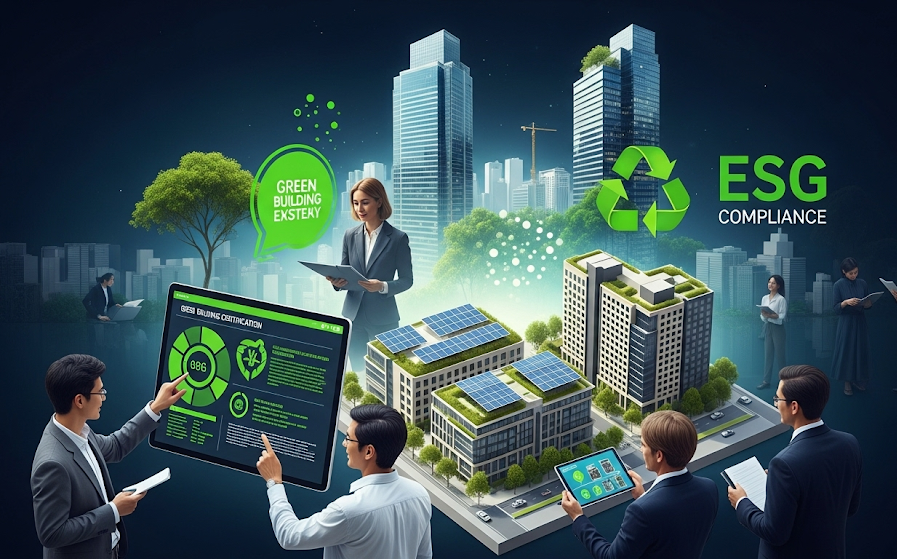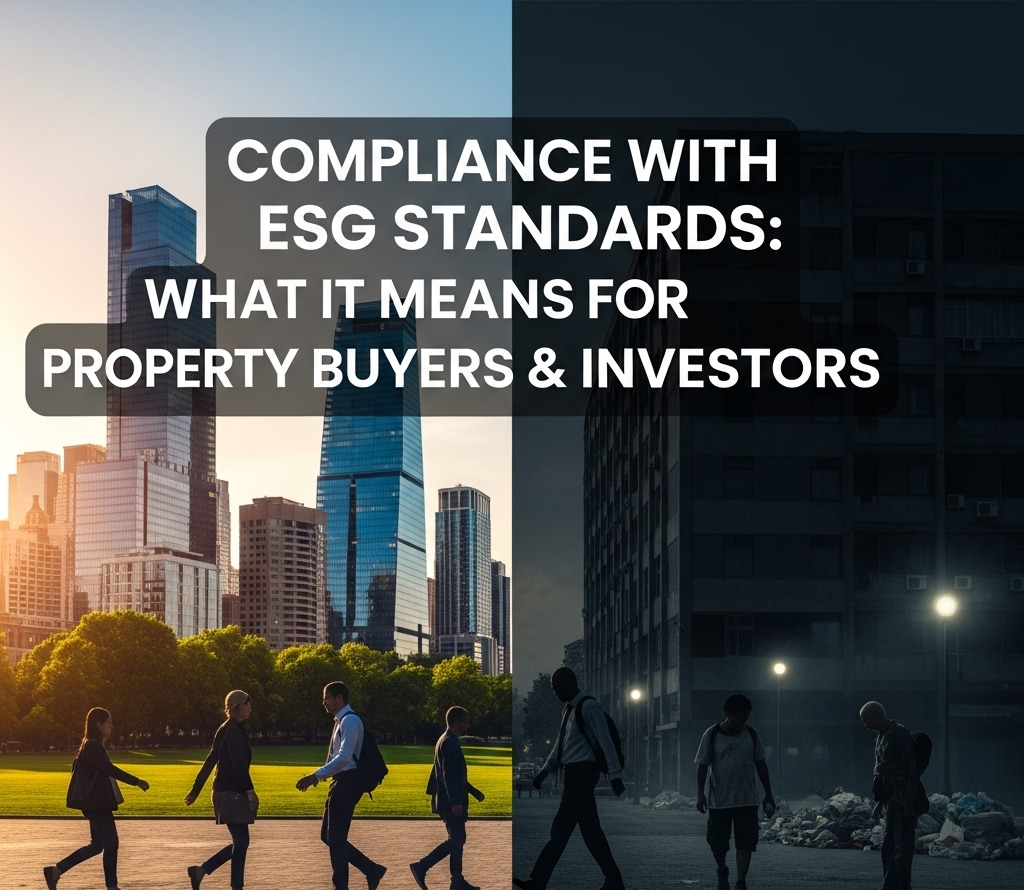When you think about buying a home or investing in property, the usual checklist comes to mind: location, budget, builder reputation, and future appreciation. But in today’s real estate world, there’s another powerful factor shaping decisions—ESG compliance. ESG stands for Environmental, Social, and Governance, and it has become more than just a buzzword. It’s a new standard that guides how real estate is built, managed, and valued.
For property buyers and investors, ESG is no longer an optional “nice-to-have.” It is quickly becoming the foundation of how the market operates. Whether you’re a first-time homebuyer or an investor looking to grow your portfolio, understanding ESG helps you make smarter, future-ready choices.
What is ESG in Real Estate?
To put it simply, ESG in real estate refers to how sustainable, ethical, and transparent a property is in its planning, development, and management.
- Environmental covers aspects like energy efficiency, water conservation, renewable energy usage, waste management, and green certifications. A building designed to minimize its carbon footprint stands out as environmentally responsible.
- Social deals with how properties affect people—be it the well-being of residents, inclusivity, community-building, or labor rights in construction projects.
- Governance ensures legal compliance, transparency in documentation, adherence to RERA, and fair practices by builders and developers.
So, when you buy or invest in ESG-compliant real estate, you’re not just acquiring property—you’re stepping into a system that respects the environment, supports communities, and operates with accountability.
Why ESG Matters to Buyers & Investors
For homebuyers, ESG translates to healthier, more sustainable living. Green-certified homes often come with better air quality, reduced energy bills, and a stronger sense of community. Imagine living in a home that saves you money on electricity and water while also contributing positively to the environment—that’s ESG in action.
For investors, ESG compliance means properties with better long-term value. Global investment trends already show that ESG-compliant assets attract higher demand and better rental yields. A green, well-governed property not only appreciates in value but also protects investors from risks like legal disputes, outdated infrastructure, or regulatory crackdowns.
When you ask yourself how to invest in real estate today, ESG compliance should become part of your decision-making process. It’s not just about location and price anymore—it’s about future-proofing your investment.
Government & Developers Driving ESG
Governments across the world, including India, are actively encouraging ESG-friendly real estate. Policies such as mandatory RERA registration, energy-efficient building codes, and incentives for green projects are pushing developers to embrace sustainable practices. Certifications like LEED, IGBC, and GRIHA are now widely recognized as benchmarks of quality.
On the developer side, major real estate companies are investing heavily in eco-friendly construction, renewable energy systems, and transparent governance practices. This shift isn’t just about meeting regulations—it’s about meeting the growing demand from buyers who care about sustainability.

ESG Advantage in Real Estate Investments
Investing in ESG-compliant properties gives you a significant edge.
Lower Risks
Properties designed with sustainability in mind are less likely to face penalties or legal hurdles in the future.
Higher Returns
Tenants and buyers are increasingly willing to pay a premium for green-certified, responsibly built properties.
Market Trust
Transparent governance builds confidence among investors, reducing the chances of fraud or mismanagement.
For someone wondering how to invest in real estate with long-term stability in mind, ESG-focused assets are a safe bet. They align with global investment trends and ensure your money works harder for you over time.
Challenges in ESG Adoption
While ESG brings enormous benefits, it also comes with challenges. Many developers highlight higher upfront costs for sustainable construction, which can make such properties slightly more expensive in the beginning. For buyers, the lack of awareness about ESG standards often means they don’t know what to look for when choosing a property.
Investors also face difficulties in verifying governance practices or checking the accuracy of ESG claims. The market is evolving, but more education and standardized reporting will make the process smoother in the coming years.
How Buyers & Investors Can Factor ESG into Decisions
So, as a buyer or investor, how do you put ESG into practice? Here are some practical steps explained in simple terms:
- Check for Certifications: Look for LEED, IGBC, or GRIHA certifications when considering new projects.
- Ask About Sustainability Features: Energy-efficient lighting, rainwater harvesting, solar panels, and waste management systems are strong indicators of environmental compliance.
- Evaluate Transparency: Ensure the builder is RERA registered and provides clear documentation.
- Think Long-Term: Even if ESG-compliant homes cost slightly more initially, they save money in the long run through reduced utility bills and higher resale values.
This approach is especially useful if you’re figuring out how to invest in real estate without falling for short-term hype. ESG gives you a reliable filter to judge properties.
The Future of ESG in Real Estate
The demand for ESG-compliant real estate is only going to rise. Globally, institutional investors already prioritize ESG as part of their property portfolios. In India too, buyers are becoming more conscious of sustainability and governance. In a few years, ESG will not be a differentiator—it will be the norm.
For property buyers, this means healthier and more responsible communities. For investors, it means safer, more profitable, and more resilient assets. The earlier you adapt to this shift, the more you stand to gain.
Final Words
ESG compliance is more than just a regulatory checkbox—it’s a blueprint for the future of real estate. Whether you’re planning to buy your dream home or expand your investment portfolio, factoring in ESG is no longer optional. It ensures your decisions are not only financially sound but also socially and environmentally responsible.
The next time you’re asking yourself how to invest in real estate, remember this: the smartest investment is one that balances profits with purpose. And that’s exactly what ESG compliance delivers.
FAQs
ESG in real estate refers to Environmental, Social, and Governance standards. These measure how sustainable, ethical, and transparent a property or project is.
ESG-compliant properties usually have higher resale value, attract better rental yields, and face fewer risks from regulations or outdated infrastructure.
Yes. While upfront costs may be slightly higher, ESG properties deliver better long-term returns, higher demand, and stronger market reputation.
Look for certifications such as LEED, IGBC, or GRIHA. Also, check for sustainable features like solar power, rainwater harvesting, and waste management systems.
ESG matters to everyone. For first-time buyers, it means healthier living and lower bills. For investors, it means reduced risks and higher profits.


Write Your Comment